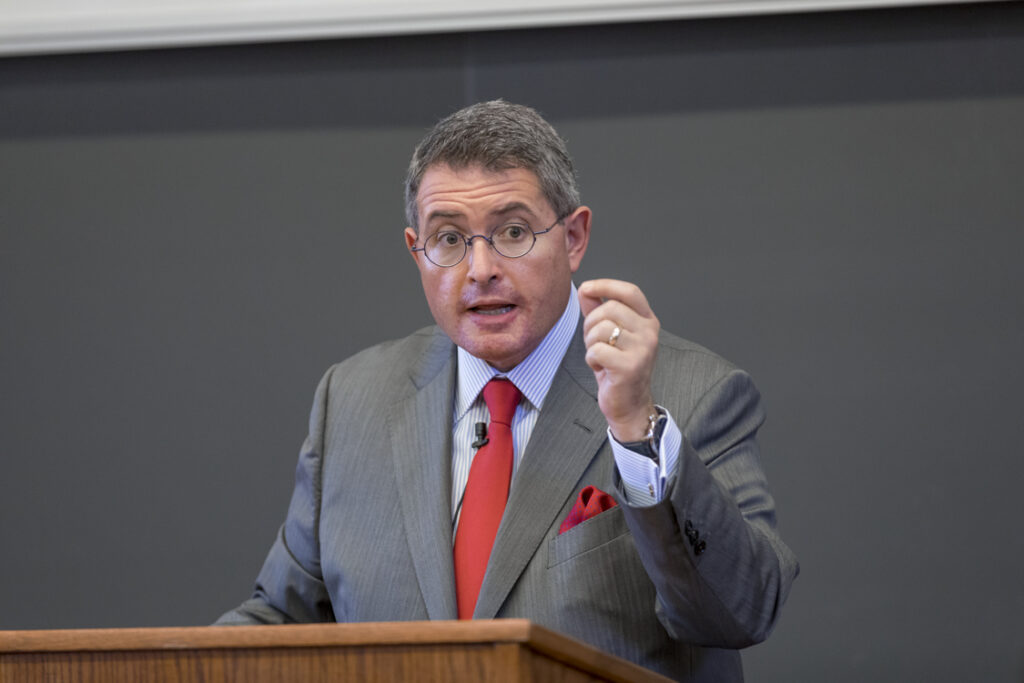This website uses cookies
We use cookies to ensure that we give you the best experience on our website. If you continue to use this site we will assume that you are happy with it.
What judicial philosophy drives the selection of federal judges? Cornell students and faculty recently heard insights from someone intimately familiar with the current selection process. Leonard Leo, AB ’87, JD ’89, executive vice president of the Federalist Society, serves as President Trump’s advisor on Supreme Court and judicial nominations. On October 18, he visited the Law School to deliver “Judicial Selection and Virtue,” presented by the Dean’s Distinguished Lecture Series and Cornell Law School’s Federalist Society, which Leo founded while a law student.

Leonard Leo, AB ’87, JD ’89
“The goal of the lecture series,” said Eduardo Peñalver, the Allan R. Tessler Dean and Professor of Law, “is to bring our most successful and interesting graduates back to campus to speak with students over lunch. Leonard Leo certainly fits the bill.” Peñalver noted that “by some accounts Leo is responsible for one third of the Justices on the U.S. Supreme Court” due to his role as an influential advisor to two U.S. presidents.
“It’s heartening to me that I can say today what I would have said thirty years ago,” Leo began, “Cornell Law School is committed to academic freedom, intellectual diversity, and unbridled, truth-seeking inquiry.” He noted that some of what he had to say might not be widely accepted, but he asserted, “In my more than quarter-century of experience relating to issues of judicial politics, I have met precious few whose philosophy, whether I agreed or disagreed with it, was driven by anything other than altruistic, principled motivations.”
Leo went on to discuss one of those judicial philosophies with which he disagrees: the “judicial overreach” that he says is championed by progressives. “Liberals have sought to invest in the Supreme Court something very close to absolute power,” he said, citing examples of “overreach” including the rulings in Roe v. Wade and Obergefell v. Hodges, the 2015 case on same-sex marriage.
He criticized the judges behind such decisions for failing to respect the “structural Constitution,” which deals with the parameters of the power allocated to the government’s various bodies. Leo argued that the framers of the Constitution envisioned a “dutiful Court, exercising only its rightful and essential powers and making sure that the other branches do the same.”
Addressing what he saw to be the causes of “judicial overreach,” Leo identified as a prime suspect the legal realist school of the early twentieth century, which he said viewed the law as a means to social ends. He lauded such opponents of this approach as Justice Antonin Scalia, as well as judges appointed by Presidents Ronald Reagan, George H.W. Bush, and George W. Bush.
As for the current administration, Leo averred, “Our forty-fifth president is, based on my experience, a man with an eye for opportunity, and he sees that chance history has given him to change the American judiciary.” He noted that, over the next few years, the president may have the opportunity to fill up to three Supreme Court vacancies and more than 200 judicial positions in the lower courts.
Leo praised Justice Gorsuch, whose selection and confirmation process he helped manage, for embodying the prudence, justice, temperance, fortitude, and fierce, American independence that make for a good judge. “The great news,” he concluded, “is that I think a great many more [like him] are on the way.”
Leo’s lecture was followed by a Q&A touching on a variety of topics, including further details of the judicial selection process. Speaking on the importance of character, Leo asserted, “That’s why the meeting with the president, the final meeting for the finalists, is essential-because the president may not be schooled in the law the way we are, they may not know a whole lot about the intricacies of how our courts work, but most presidents in American history are very good judges of people.”